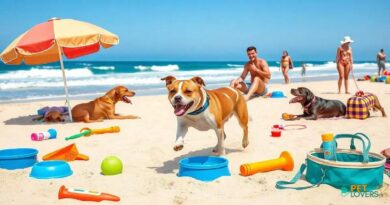What is Reatividade em socialização
Understanding Reactivity in Dog Socialization
Reactivity in dog socialization refers to a dog’s heightened response to certain stimuli, which can include other dogs, people, or environmental factors. This behavior often manifests as barking, lunging, or aggressive posturing, and is a crucial aspect of canine behavior that owners need to understand. Reactivity is not inherently negative; it can be a natural response to perceived threats or overwhelming situations.
The Causes of Reactivity in Dogs
Several factors contribute to reactivity in dogs, including genetics, early socialization experiences, and environmental influences. Dogs that have not been adequately socialized during their critical developmental periods may react more strongly to unfamiliar situations. Additionally, certain breeds are predisposed to be more reactive due to their historical roles, such as guarding or herding. Understanding these underlying causes is essential for effective management and training.
Signs of Reactivity in Dogs
Recognizing the signs of reactivity is vital for dog owners. Common indicators include intense barking, growling, stiff body posture, and a focused gaze on the trigger. A reactive dog may also exhibit behaviors such as jumping, pulling on the leash, or attempting to escape from the situation. Identifying these signs early can help owners take proactive measures to manage their dog’s behavior and prevent escalation.
The Impact of Environment on Reactivity
The environment plays a significant role in a dog’s reactivity. Factors such as noise levels, the presence of other animals, and unfamiliar settings can heighten a dog’s stress and trigger reactive behaviors. For instance, a dog that is comfortable in a quiet park may become reactive in a bustling urban environment. Understanding how different environments affect a dog’s behavior can help owners prepare for socialization outings.
Training Techniques for Managing Reactivity
Effective training techniques are essential for managing reactivity in dogs. Positive reinforcement methods, such as rewarding calm behavior and gradually exposing the dog to triggers at a distance, can help desensitize them. Techniques like counter-conditioning, where the dog learns to associate the trigger with positive experiences, can also be beneficial. Consistency and patience are key components in this training process.
The Role of Professional Help
In some cases, seeking professional help from a certified dog trainer or behaviorist may be necessary. Professionals can provide tailored training plans and guidance to address specific reactive behaviors. They can also help owners understand their dog’s body language and signals, ensuring a safer and more effective approach to socialization.
Socialization Strategies for Reactive Dogs
Socialization strategies for reactive dogs should be gradual and controlled. Owners can start by exposing their dogs to low-stress environments where they can observe other dogs or people from a distance. Gradually decreasing the distance to the trigger while maintaining the dog’s comfort level can help build confidence. Structured playdates with calm, well-socialized dogs can also be beneficial.
The Importance of Patience and Consistency
Patience and consistency are crucial when addressing reactivity in dogs. Progress may be slow, and setbacks can occur, but maintaining a calm and positive demeanor will help reinforce the desired behaviors. Regular training sessions and socialization outings should be part of the dog’s routine to ensure ongoing improvement and confidence-building.
Monitoring Progress and Adjusting Techniques
Monitoring a dog’s progress is essential for effective management of reactivity. Owners should keep track of their dog’s responses to various stimuli and adjust training techniques as needed. If certain methods are not yielding results, it may be necessary to revisit the training plan or consult with a professional for new strategies.
Conclusion: Embracing the Journey of Socialization
Understanding and managing reactivity in dog socialization is a journey that requires dedication and effort. By recognizing the signs, implementing effective training techniques, and seeking professional guidance when necessary, owners can help their dogs become more confident and well-adjusted in social situations. Embracing this journey not only benefits the dog but also enhances the bond between the dog and its owner.



